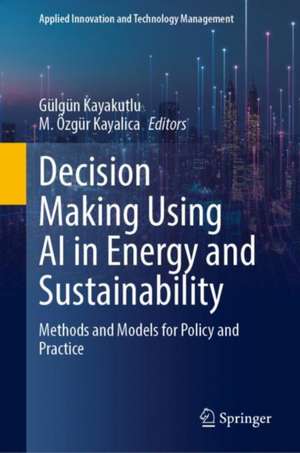Decision Making Using AI in Energy and Sustainability: Methods and Models for Policy and Practice: Applied Innovation and Technology Management
Editat de Gülgün Kayakutlu, M. Özgür Kayalicaen Limba Engleză Hardback – 17 oct 2023
Preț: 1115.46 lei
Preț vechi: 1360.32 lei
-18% Nou
Puncte Express: 1673
Preț estimativ în valută:
213.47€ • 218.61$ • 177.57£
213.47€ • 218.61$ • 177.57£
Carte tipărită la comandă
Livrare economică 19 martie-02 aprilie
Preluare comenzi: 021 569.72.76
Specificații
ISBN-13: 9783031383861
ISBN-10: 3031383869
Pagini: 312
Ilustrații: XI, 312 p. 83 illus., 77 illus. in color.
Dimensiuni: 155 x 235 mm
Greutate: 0.64 kg
Ediția:1st ed. 2023
Editura: Springer International Publishing
Colecția Springer
Seria Applied Innovation and Technology Management
Locul publicării:Cham, Switzerland
ISBN-10: 3031383869
Pagini: 312
Ilustrații: XI, 312 p. 83 illus., 77 illus. in color.
Dimensiuni: 155 x 235 mm
Greutate: 0.64 kg
Ediția:1st ed. 2023
Editura: Springer International Publishing
Colecția Springer
Seria Applied Innovation and Technology Management
Locul publicării:Cham, Switzerland
Cuprins
1. Climate change – Can AI help understanding and more effective facing of various interrelated impacts?- 2. A methodology for linking the Energy-related Policies of the European Green Deal to the 17 SDGs using Machine Learning.- 3. Single-valued neutrosophic CRITIC-based ARAS method for the assessment of sustainable circular supplier selection.- 4. Linguistic-Based MCDM Approach for Climate Change Risk Evaluation Methodology.- 5. Creating a Net-Zero Carbon Emission Scenario Using OSeMOSYS for the Power Sector of Turkey.- 6. Prediction of Downward Surface Solar Radiation Using Particle Swarm Optimization and Neural Networks.- 7. Electricity Demand Prediction: Case of Turkey.- 8. The Impact Of The Wind Energy Power Forecast Accuracy On The Price Of Electricity.- 9. The Power of Combination Models in Energy Demand Forecasting.- 10. Data-driven state classification for energy modeling of machine tools using power signals and part-program information.- 11. Energy Efficiency Optimization Application in Food Production using IIOT based Machine Learning.- 12. Hype: a data-driven tool for smart city profile (SCP) discrimination.- 13. An Integrated Hesitant Fuzzy Linguistic MCDM Methods to Assess Smart City Solutions.- 14. Presence of Renewable Resources in a Smart City for Supplying Clean and Sustainable Energy.- 15. Syrian Household Energy Consumption Behavior Analysis In Turkey: Bayesian Belief Network.- 16. Informativeness in Twitter Textual Contents for Farmer-centric Pest Monitoring.- 17. A Multi-Criteria Decision-Making Model for Technology Selection in Renewable-Based Residential Microgrids.- 18. Energy Management in Power-Split Hybrid Electric Vehicles Using Fuzzy Logic Controller.
Notă biografică
Gulgun Kayakutlu is Professor in the Department of Energy Planning and Management at the Energy Institute of Istanbul Technical University (Turkey). Before joining the University, she was the founder and General Manager of Sybase Turkey, where she managed several real-time transaction projects in the private sector and many B2B projects in the government sector. She wrote the book Intelligence in Energy (Elsevier, 2017) and co-edited Energy Management—Collective and Computational Intelligence with Theory and Applications (Springer, 2018). Dr. Kayakutlu has published more than fifty articles in SCI and SSCI reviewed journals on energy optimization and intelligence.
M. Özgür Kayalica is a Senior Lecturer in the Energy Institute and Director of the Technological and Economic Development Research Center (TEGAM) at Istanbul Technical University (Turkey). Dr. Kayalica’s research focuses on the microeconomics of environmental economics, energy economics andtrade theory. Dr. Kayalica published books and numerous articles in SCI and SSCI indexed journals.
M. Özgür Kayalica is a Senior Lecturer in the Energy Institute and Director of the Technological and Economic Development Research Center (TEGAM) at Istanbul Technical University (Turkey). Dr. Kayalica’s research focuses on the microeconomics of environmental economics, energy economics andtrade theory. Dr. Kayalica published books and numerous articles in SCI and SSCI indexed journals.
Textul de pe ultima copertă
Artificial intelligence (AI) has a huge impact on science and technology, including energy, where access to resources has been a source of geopolitical conflicts. AI can predict the demand and supply of renewable energy, optimize efficiency in energy systems, and improve the management of natural energy resources, among other things. This book explores the use of AI tools for improving the management of energy systems and providing sustainability with smart cities, smart facilities, smart buildings, smart transportation, and smart houses. Featuring research from International Federation for Information Processing's (IFIP) “AI in Energy and Sustainability” working group, this book provides new models and algorithms for AI applications in energy and sustainability fields. Any short-term, mid-term and long-term forecasting, optimization models, trend foresights and prescriptions based on scenarios are studied in the energy world and the smart systems for sustainability. The contents of this book are valuable for energy researchers, academics, scholars, practitioners and policy makers.
Caracteristici
Explores energy and sustainability issues throughout the globe Provides new models and algorithms for AI applications in energy and sustainability Features topics such as smart cities, food production, smart housing, and smart transportation





